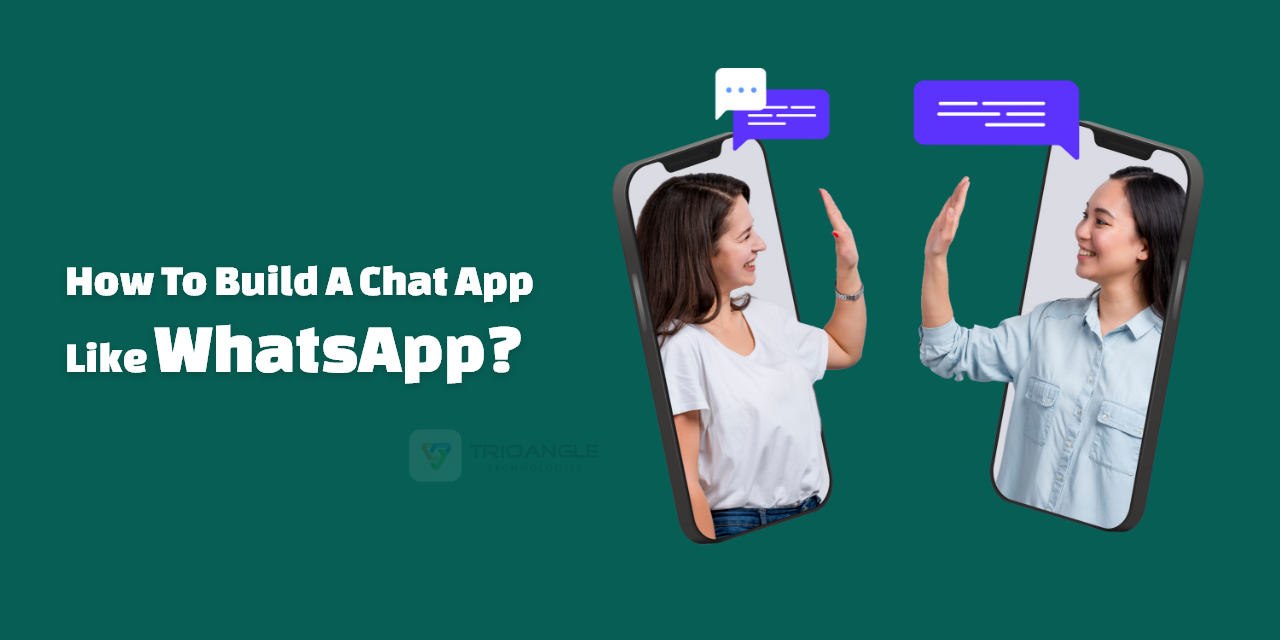The era of instant communication has revolutionized the way we interact with each other. In this digital age, messaging apps have become an indispensable part of our lives.
Among the plethora of messaging apps available in the market, WhatsApp has emerged as a frontrunner, with over 2 billion active users worldwide.
Have you ever wondered how WhatsApp became such a massive success and how you could create your messaging app like WhatsApp?
Well, you’re in luck because, in this blog, we’ll be discussing the nitty-gritty of how to build a chat app like WhatsApp.
Creating a WhatsApp clone app might seem like a daunting task, but with proper planning, research, and development, it’s entirely achievable.
So buckle up and get started on the journey of ruling the digital era by kickstarting your business By building a chat app like WhatsApp.
What is a Chat App Like WhatsApp?
A real-time chat app like WhatsApp is an instant messaging application that allows users to send text messages, voice messages, images, videos, and documents to other users who have the app installed on their devices.
The app uses an internet connection, either cellular data or Wi-Fi, to send and receive messages, making it a convenient and cost-effective way to communicate with people all over the world.
WhatsApp offers end-to-end encryption to ensure that messages are secure and private, and it also has features like group chats, voice, and video calls, and the ability to share your location.
Other popular real-time chat apps like WhatsApp include Telegram, WeChat, and Facebook Messenger.
Each of these apps has its unique features and user base, but they all offer a similar messaging experience that is fast, reliable, and easy to use.
Messaging App Market Share
WhatsApp is one of the most popular chat apps, but several others are also widely used. Here are some statistics on messaging apps like WhatsApp:
- According to Statista, The topmost messaging apps by the number of users are WhatsApp has 2 billion users, WeChat has 1.2 billion users, and Facebook Messenger has 1 billion users.
- Facebook Messenger is the most popular messaging app in the US, with 135.9 million users in 2021.
- 60% of people prefer messaging over email or phone calls.
- There are 2.52 billion people using messaging apps on mobile, this is expected to reach 3 billion in 2023.
- Messaging apps have more active monthly users than social media platforms by 20%.
- WhatsApp and Facebook Messenger are the most downloaded apps globally.
- WhatsApp Business has acquired over 50 million users each month.
- 66% of consumers feel more confident about making a purchase when a company is active in messaging apps.
These statistics show that the number of messaging app users continuing to grow, it’s likely that messaging apps will play an increasingly important role in our daily lives.
Trends in Building a Chat App Like WhatsApp
Messaging apps have become an integral part of our daily lives. With over 2 billion users worldwide, WhatsApp continues to set the standard for messaging apps.
However, to stay ahead of the competition, chat app developers need to be aware of the latest trends in the industry.
Here are some latest trends in building the best on-demand WhatsApp clone script:
Encryption and Security
In today’s digital landscape, users are becoming more aware of the importance of their privacy and security.
Messaging apps that prioritize privacy and security are becoming increasingly popular. End-to-end encryption is becoming the standard in messaging apps like WhatsApp.
This feature ensures that only the sender and receiver of messages can read them.
Building a chat app with robust security features can attract more users and provide a safe user experience.
Cloud Services
Building chat apps requires a robust infrastructure to support messaging, video, and voice calls.
Cloud services offer a cost-effective and scalable solution for building chat apps.
Cloud services also provide data storage, backup, and recovery services that are essential for chat apps.
Messaging apps like WhatsApp use cloud services to store data and provide users with fast access to their messages.
Building a chat app that utilizes cloud services can improve user experience and ensure efficient data management.
Multimedia Messaging
Multimedia messaging is becoming more prevalent in messaging apps. Users now expect messaging apps to support multimedia files like images, videos, and audio files.
Building a chat app that allows users to send multimedia files can increase user engagement and provide a better user experience.
Chatbots and AI
Artificial Intelligence (AI) and Chatbots are becoming increasingly popular in messaging apps. Chatbots can handle simple customer queries, provide support, and even automate certain tasks.
Building a chat app with chatbot and AI capabilities can enhance the user experience and reduce the workload for customer support teams.
Cross-Platform Compatibility
Chatting apps that are compatible across multiple platforms, including desktop and mobile, are becoming more popular.
Users expect messaging apps to be accessible on all their devices.
Building a chat app that is compatible with Android, iOS, and desktop devices can increase user engagement and ensure that users can access the app from any device.
Integration with Other Apps
Building a chat app that integrates with other apps can enhance user experience and increase engagement.
Integration with social media apps, eCommerce platforms, and other services can make the chat app a one-stop shop for users and make your instant messaging app stand out from the competition.
Steps to Build a Chat App Like WhatsApp
Building a chat app like WhatsApp may seem like a daunting task, but it’s not as difficult as you may think.
With the right tools and techniques, you can create a chat app that’s secure, reliable, and easy to use.
Here are the essential steps you need to take for how to build a chat app like WhatsApp:
Brainstorm Your Idea
To develop a chat app like WhatsApp, it’s crucial to carefully consider every aspect of the process, from the initial idea to the app’s launch.
This includes identifying potential challenges and obstacles that may arise during development.
The first step in how to build your real-time chat app like WhatsApp is to determine your target audience and consider how your app can provide value to their lives.
Researching your target market and creating a list of necessary features to integrate into your app can also be helpful in this process.
By carefully considering these factors, you can increase your chances of creating a messaging app that meets the needs and expectations of your intended users.
Decide the Platform for Building a Chat App Like WhatsApp
Once you’ve identified your target audience and decided on the necessary features for your messaging app, the next step in how to build a chat app like WhatsApp is to choose the platform for development.
You’ll need to decide whether to develop for Android, iOS, or both.
While native Android and iOS apps provide a better user experience and performance, they require significant time and resources for development.
If you want to create an app for both platforms, you can consider using frameworks like React Native or Flutter to build a cross-platform app.
It’s also recommended to start with a minimum viable product (MVP) to test and validate your idea.
Based on user feedback, you can develop a full-fledged messaging app, which can save you time and money.
Focus on User Experience (UX)
The User Experience (UX) of your messaging app is critical to its success. It greatly affects the usability, installation rate, and customer feedback of your app.
Apps with poor UX tend to get uninstalled quickly.
WhatsApp’s success can be attributed in part to its intuitive and engaging UX, which motivated users to engage in texting without hesitation.
Therefore, it’s essential to prioritize the UI/UX of your messaging app to make a positive first impression and reduce the risk of high uninstall rates.
Add Essential Features to Your Chat App Like WhatsApp
After completing the previous steps and approaching the final step on how to develop a chat app like WhatsApp, it’s essential to ensure that your messaging app includes the critical features that all chat apps should have.
The essential features in your WhatsApp like app include the,
- Registration
- An address book for contacts
- One-on-one, and group chats
- Voice and Video calls
- Multimedia file transmission
- Notifications
These features are crucial for ensuring your app’s functionality and user experience, making it comparable to popular messaging apps like WhatsApp.
Once you’ve confirmed that your app has all these features, you can move on to the final step of testing and launching your app.
Test Your Chat App Like WhatsApp
Quality assessment is a crucial step in the process of how to develop a chat app like WhatsApp.
As it helps to identify and resolve any bugs, performance issues, or user experience problems before launching your app to the public.
This process involves several testing modules across various stages of development to test the app’s functionality and identify any errors or bugs.
These errors are then reported to the programming experts for debugging.
Once the quality assessment team approves the app, the chatting app like WhatsApp will be ready for the final deployment.
Launch Your Chat App Like WhatsApp
Once you have completed the development and testing phases of your chatting app, the final step in how to build a chat app like WhatsApp is to deploy it to the public through various platforms such as Android and iOS.
This stage is crucial in determining the success of your app and its ability to attract and retain users.
To ensure maximum visibility, you can promote your app through various social media channels and platforms.
Challenges and Solutions in Building a Chat App Like WhatsApp
Building a top-notch WhatsApp clone app with competing features can come with a variety of challenges, but there are also solutions to help overcome them.
Here are some common challenges and solutions to consider:
Technical Challenges
Developing a chat app requires expertise in different programming languages, frameworks, and libraries.
It can also be difficult to optimize the app for different devices and operating systems.
Solution:
Hire a team of experienced developers with expertise in the relevant technologies. Consider outsourcing development to a reliable vendor with a track of delivering high-quality chat apps.
Security
Security is a crucial aspect of any chat app, and it can be challenging to ensure that messages and user data are protected from hackers and cyber threats.
Solution:
Use end-to-end encryption to ensure that messages are protected from unauthorized access. Implement two-factor authentication, secure login, and secure storage to protect user data.
User Acquisition
It can be difficult to attract users to new chat apps, especially when there are already established competitors in the market.
Solution:
Create a unique value proposition that differentiates your app from competitors. Leverage social media and influencer marketing to promote your app and attract users.
Offer incentives to early adopters to encourage them to try the app.
Scalability
As the user base grows, it can be challenging to ensure that the app can handle the increased traffic and provide a smooth user experience.
Solution:
Implement scalable infrastructure and use cloud-based services to handle increased traffic.
Use analytics and monitoring tools to identify performance bottlenecks and optimize the app for better performance.
Monetization Methods in Building a Chat App Like WhatsApp
Various monetization methods can be implemented while building a real-time chat app like WhatsApp. Some of them are:
Advertising
Advertising is a common method of generating revenue for many apps, including messaging apps. You can display ads in the form of banners or videos within the app.
The ads can be targeted based on user behavior and demographics, making them more effective.
However, too many ads can hamper the user experience and drive users away from the app.
In-App Purchases
In-app purchases are another monetization method you can consider. You can offer users the option to purchase premium features or virtual goods within the app.
For instance, users can pay to unlock additional emojis, stickers, or themes.
This method works best when the app provides value to the users, and the in-app purchases enhance their experience.
Transaction Fees
Transaction fees are a popular monetization method for apps that facilitate peer-to-peer transactions.
For instance, if your messaging app allows users to transfer money to one another, you can charge a small transaction fee for each transfer.
This method is commonly used by payment apps like PayPal, Venmo, and Cash App.
Subscription
A subscription model is another monetization method that you consider.
Users can pay a monthly or yearly subscription fee to access premium features or exclusive content within the app.
This method works best for apps that offer unique value propositions and cater to a niche audience.
Examples of apps that use the subscription model include Spotify, Netflix, and Medium.
Final Words
Building a WhatsApp like app requires a lot of effort and resources, but it can be a lucrative venture with the right strategy and execution.
By following the steps outlined in this blog and continually improving the app, it’s possible to build your real-time chat application like WhatsApp that can compete with WhatsApp and other messaging platforms.
However, it’s essential to keep in mind that the messaging app market is highly competitive, and success isn’t guaranteed.
To increase your chance of success, you need to prioritize user experience, offer unique features, and continually improve and update your app.




